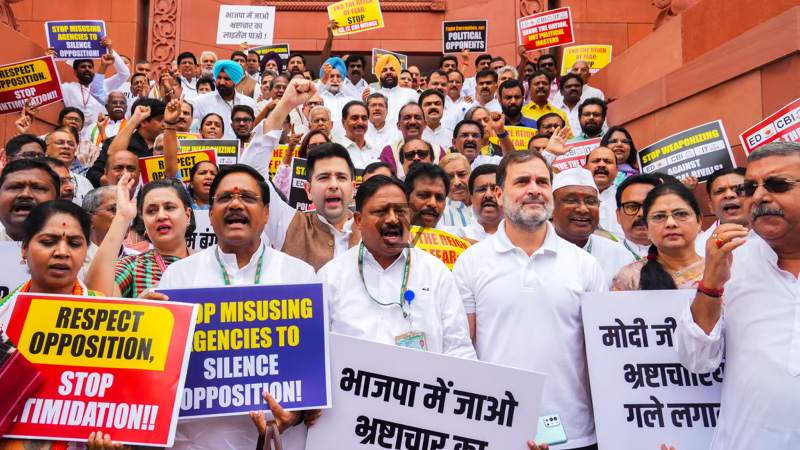Heated debates in Parliament over NEET paper leak and new criminal laws.
Opposition MPs protest outside Parliament, alleging misuse of central agencies.
Three new criminal codes replace British-era laws, overhauling India’s justice system.
The Parliament session today was marked by significant uproar and protests, with the NEET paper leak controversy taking center stage. Opposition Leader Mallikarjun Kharge in the Rajya Sabha called for a Supreme Court review of the entire education system, leading to a heated exchange with Leader of the House J P Nadda.
Amidst these tensions, three new criminal codes were implemented, replacing the Indian Penal Code, Code of Criminal Procedure, and the Indian Evidence Act. The Bharatiya Nyaya Sanhita, Bharatiya Nagarik Suraksha Sanhita, and the Bharatiya Sakshya Adhiniyam aim to modernize India‘s criminal justice system, a move welcomed by the government but criticized by the Opposition for not addressing foundational issues affecting minority communities.
Opposition Protests and Legislative Overhaul Mark Parliament Session 2024
In the Lok Sabha, Speaker Om Birla’s decision to reject adjournment motions related to the NEET issue and his refusal to allow a one-day discussion proposed by Rahul Gandhi led to widespread protests. Several Opposition MPs staged a walkout, highlighting their dissatisfaction with the government’s handling of the issue. Outside Parliament, Opposition MPs, including Rahul Gandhi, protested against the alleged misuse of central agencies like the CBI and Enforcement Directorate.
The session also marked a significant legislative overhaul with the implementation of three new criminal codes. The Bharatiya Nyaya Sanhita, Bharatiya Nagarik Suraksha Sanhita, and the Bharatiya Sakshya Adhiniyam have replaced the Indian Penal Code, Code of Criminal Procedure, and the Indian Evidence Act, respectively. These new laws aim to modernize India’s criminal justice system, addressing issues that have persisted since the colonial era.
Despite the government‘s praise for these legislative changes, the Opposition criticized the President’s Address for ignoring the needs of the weakest sections of society. They argued that the new laws do not adequately address the systemic issues affecting minority communities, which continue to face discrimination and injustice.
Today’s Parliament session highlighted the deep divisions between the government and the Opposition, with significant controversies over NEET and new criminal laws sparking intense debates and protests. The session underscored the need for more inclusive and transparent legislative processes.
“Kharge later alleged that despite having raised his hand for a long time, he was not given an opportunity to speak,” which exemplifies the growing frustration and sense of marginalization felt by the Opposition in the current parliamentary proceedings.



